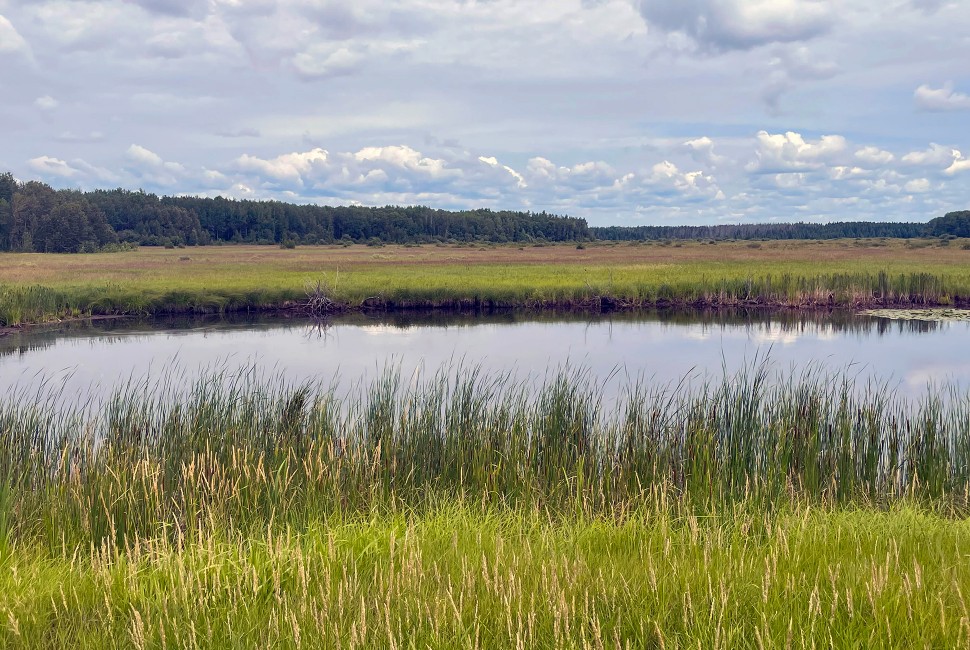A Northwestern University-led research team has received a $2 million grant over three years from the National Science Foundation (NSF) to build on its work with Ojibwe tribes in the western Great Lakes region studying the health and socio-ecological conditions of manoomin (wild rice in Ojibwe).
Manoomin, which grows in the Great Lakes’ fringing wetlands systems, is ecologically, culturally and dietarily important to Native Nations. When manoomin is threatened, Ojibwe resilience is threatened. The health of the sacred food and the environments in which it grows has varied in recent years due to extreme weather events, warming waters, rapid habitat loss and pollution.
The new research project centers on tribal sovereignty and resilience to climate change and is part of a broad initiative that includes STRONG (Strengthening Resilience of Ojibwe Nations Across Generations) and the Coastlines and People (CoPe) Hub established last year by the NSF. The work will focus on using environmental data from smart sensors in key lakes, rivers and wetlands to support tribal sovereignty by helping tribal leaders, agencies and communities integrate these data into their resilience and manoomin governance strategies. The data collected relates closely to tribal priorities.
Within this STRONG-Manoomin Collective, which includes CoPe, Indigenous tribes, conservationists and researchers are using a holistic, transdisciplinary approach to understand the interconnected human, coastal and climate change issues causing the decline of this keystone sentinel species in some areas.
“Manoomin is foundational to Ojibwe identity — it is part of their origin story,” said Kimberly Marion Suiseeya, an environmental social scientist and the principal investigator of the new NSF grant.
“The main threat identified by our Ojibwe partners regarding manoomin’s decline is an erosion of tribal sovereignty and their sense of belonging and well-being,” she said. “Across the globe, Indigenous people are the most vulnerable to climate change. We have a lot to learn about resilience from them.”
Suiseeya is an associate professor in the department of political science and the environmental policy and culture program in Northwestern’s Weinberg College of Arts and Sciences. She is a faculty affiliate of the Center for Native American and Indigenous Research and the Center for the Study of Diversity and Democracy.
Conducting institutional and empirical environmental justice analyses to understand how tribal sovereignty and Indigenous self-determination relate to socio-ecological resilience is a critical part of the project.
“Ultimately, we need to understand how our socio-political and socio-economic systems and practices support or undermine effective environmental governance and resilience to climate change,” Suiseeya said.
Co-principal investigators are Aaron Packman, professor of civil and environmental engineering at the McCormick School of Engineering; Josiah Hester, associate professor at Georgia Institute of Technology and adjunct assistant professor of computer science, computer engineering and electrical engineering at Northwestern; Peter Beckman, co-director of the Northwestern Argonne Institute of Science and Engineering; and Jonathan Gilbert, director of the biological sciences division of the Great Lakes Indian Fish and Wildlife Commission.
This NSF funding will help the collective focus on STRONG’s three goals: 1) Synthesizing traditional knowledge and scientific knowledge with new data collected through advanced sensing technologies to inform tribal governance for resilience to climate change; 2) Co-producing culturally appropriate resilience indicators to anticipate, respond to and mitigate acute and chronic socio-ecological perturbations; and 3) Co-developing and deploying “Noondawind,” a dynamic, integrated and networked cyberinfrastructure platform to generate community impact by connecting diverse end-users with STRONG data and analyses.
Initial study sites are in Minnesota and northwestern Wisconsin with sensor locations identified in collaboration with the Bad River, Lac du Flambeau and Fond du Lac tribes. Placed where manoomin grows, the smart sensors will collect a variety of atmospheric, water and ecosystem data in real time, which allows researchers to easily modify or change parameters as needed. The real-time data also will help tribes respond to acute shocks, such as wildfires, in addition to long-term effects on manoomin environments.
The sensors, which include cameras and microphones, are tied to powerful computers capable of artificial intelligence analysis. These intelligent environmental systems can produce on-the-spot reports of details that are harder to capture, such as clouds moving overhead, bird song, the number of boats on a waterway and manoomin growth. This advanced cyberinfrastructure builds on earlier NSF funding for developing a software-defined sensor network.
Just as important as collecting data is putting it to use effectively. The research team is working on developing the infrastructure — through university curricula, workshops and more — to support their Indigenous colleagues in how to best use the data to achieve tribal goals.
“We want our environmental research to help improve biodiversity and create possibilities for justice,” Suiseeya said.


